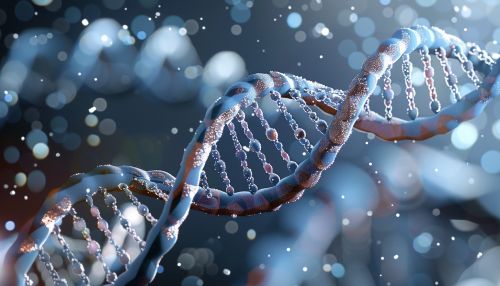Genetic history
Introduction
The Genetic history of a species, or a specific population within a species, is the record of genetic changes over time. These changes can be due to natural selection, genetic drift, gene flow, or mutation. The study of genetic history is part of the broader field of Population genetics, which also includes the study of genetic variation and the forces that influence it.


Genetic Variations
Genetic variations occur within a population when new genes are introduced or when existing genes change. These variations can be caused by mutations, which are changes in the DNA sequence of a cell's genome. Mutations can occur spontaneously, due to errors in DNA replication, or they can be induced by environmental factors such as radiation or chemicals.
Genetic Drift
Genetic drift is a mechanism of evolution that causes random changes in the frequency of alleles in a population. It occurs when the offspring of a population are not representative of the parent population in terms of their genetic makeup. This can occur due to chance events, such as the death of individuals with certain alleles or the overproduction of offspring by individuals with other alleles.
Gene Flow
Gene flow is the transfer of genetic variation from one population to another. It can occur as a result of migration, where individuals from one population move to another and breed with the individuals there. Gene flow can also occur through the exchange of pollen between plants. Gene flow tends to increase the genetic diversity of populations and can counteract the effects of genetic drift and natural selection.
Natural Selection
Natural selection is the process by which certain traits become more or less common in a population due to their effects on the survival and reproduction of their bearers. It is one of the main mechanisms of evolution. Traits that increase an individual's chances of survival and reproduction will tend to become more common over time, while traits that decrease these chances will become less common.
Genetic History of Humans
The genetic history of humans is a complex and fascinating subject. It involves the study of our ancestors, the Homo sapiens, and their journey from Africa to the rest of the world. This journey, known as the Out of Africa theory, is believed to have taken place around 70,000 years ago.
Genetic History of Plants and Animals
Just like humans, plants and animals also have a rich genetic history. The study of the genetic history of plants and animals can help us understand how species have evolved over time, how they have adapted to different environments, and how they are related to each other.
